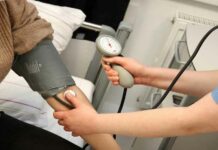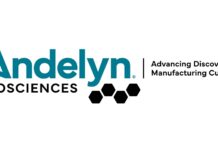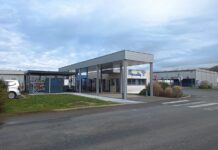Bayer announced that data from several studies across its oncology portfolio will be presented at the 52nd Annual Meeting of the American Society of Clinical Oncology (ASCO) taking place June 3-7 in Chicago, Illinois (USA).
The data represent the latest clinical research on Bayer’s oncology products, including real-world evidence on the clinical utilization of Xofigo® (radium-223 dichloride) injection as well as exploring use of the compound in other areas of metastatic castration-resistant prostate cancer (CRPC), such as updated data from a randomized phase I/IIa study for combination of radium-223 with docetaxel and data on retreatment with radium-223.
Other Bayer data to be presented at the meeting include a subgroup analysis by age from the Phase IIIb CONSIGN trial investigating Stivarga® (regorafenib) tablets in patients with metastatic colorectal cancer; and an analysis of possible prognostic or predictive biomarkers in patients with radioactive iodine refractory differentiated thyroid cancer from the Phase III DECISION trial evaluating Nexavar® (sorafenib) tablets.
Not intended for U.S. and UK Media – 52nd Annual Meeting of the American Society of Clinical Oncology (ASCO):
Bayer will also present research from additional indications and compounds currently in development, including BAY-1841788 (ODM-201), a dual-acting novel androgen receptor (AR) antagonist Bayer is jointly developing with Orion Corporation, in men with high-risk nonmetastatic CRPC, as well as anetumab ravtansine (BAY 94-9343), an anti-mesothelin antibody drug conjugate currently in Phase II for mesothelioma.
Additionally, results from the International Prostate Cancer Symptoms Survey addressing symptom burden in advanced prostate cancer from the perspectives of patients and caregivers will be presented.
Notable Bayer studies at ASCO 2016 include the following:
Radium-223 Dichloride (radium-223)
- Re-treatment with radium-223: an international, prospective, open-label study in patients with castration-resistant prostate cancer and bone metastases
o Abstract #5074, Board #331, Poster Session: Genitourinary (Prostate) Cancer
o Saturday, June 4, 1:00 PM – 4:30 PM (CDT)
- Updated results: a phase 1/2a randomized trial of radium-223 + docetaxel versus docetaxel in patients with castration-resistant prostate cancer and bone metastases
o Abstract #5075, Board #332, Poster Session: Genitourinary (Prostate) Cancer
o Saturday, June 4, 1:00 PM – 4:30 PM (CDT)
- Analysis of overall survival by number of radium-223 injections received in an international expanded access program (iEAP)
o Abstract #5082, Board #433, Poster Session: Genitourinary (Prostate) Cancer
o Saturday, June 4, 1:00 PM – 4:30 PM (CDT)
- ERA 223: a phase 3 trial of radium-223 dichloride in combination with abiraterone acetate and prednisone in the treatment of asymptomatic or mildly symptomatic chemotherapy-naïve patients with bone-predominant metastatic castration-resistant prostate cancer
o Abstract #TPS5088, Board #437b, Poster Session: Genitourinary (Prostate) Cancer
o Saturday, June 4, 1:00 PM – 4:30 PM (CDT)
- A phase 2 randomized, double-blind, placebo-controlled trial of radium-223 dichloride with exemestane and everolimus in patients with HER2–negative hormone receptor–positive breast cancer and bone metastases
o Abstract #TPS621, Board #105a, Poster Session: Breast Cancer—HER2/ER
o Sunday, June 5, 8:00 AM – 11:30 AM (CDT)
- A phase 2 randomized, double-blind, placebo-controlled trial of endocrine therapy ± radium-223 dichloride (Ra-223) in HER2- hormone receptor+ breast cancer patients with bone metastases
o Abstract #TPS622, Board #105b, Poster Session: Breast Cancer—HER2/ER
o Sunday, June 5, 8:00 AM – 11:30 AM (CDT)
Pipeline
- ARAMIS trial: Efficacy and safety of ODM-201 in men with high-risk nonmetastatic castration-resistant prostate cancer
o Abstract #TPS5094, Board #440b, Poster Session: Genitourinary (Prostate) Cancer
o Saturday, June 4, 1:00 PM – 4:30 PM (CDT)
- Phase I study of anti-mesothelin antibody drug conjugate anetumab ravtansine (AR)
o Abstract #2509, Board #209, Poster Session: Developmental Therapeutics—Clinical Pharmacology and Experimental Therapeutics
o Sunday, June 5, 8:00 AM – 11:30 AM (CDT) - A pivotal randomized phase II study of anetumab ravtansine or vinorelbine in patients with advanced or metastatic pleural mesothelioma after progression on platinum/pemetrexed-based chemotherapy (NCT02610140)
o Abstract #TPS8576, Board #201a, Poster Session: Lung Cancer—Non-Small Cell Local-Regional/Small Cell/Other Thoracic Cancers
o Saturday, June 4, 8:00 AM – 11:30 AM (CDT)
About Radium-223 Dichloride (Xofigo®)
Radium-223 dichloride (radium-223) is an alpha particle-emitting therapeutic anti-tumor pharmaceutical. It mimics calcium and selectively targets bone, specifically areas of bone metastases, by forming complexes with the bone mineral hydroxyapatite. The high linear energy transfer of alpha emitters leads to a high frequency of double-strand DNA breaks in adjacent tumor cells, resulting in a potent cytotoxic effect. The alpha particle range from radium-223 is less than 100 micrometers, which minimizes damage to the surrounding normal tissue.
Radium-223 dichloride has been approved under the brand name Xofigo® in more than 40 countries worldwide, including the U.S., countries of the European Union (EU) and Japan. In countries of the EU, it is approved for the treatment of adults with CRPC, symptomatic bone metastases and no known visceral metastases. Radium-223 is also being studied in additional trials for men with prostate cancer as well as in Phase II studies for women with breast cancer and patients with multiple myeloma.
About Regorafenib (Stivarga®)
Regorafenib is an oral multi-kinase inhibitor that inhibits various kinases within the mechanisms involved in tumor growth and progression – angiogenesis, oncogenesis and the tumor microenvironment. In preclinical studies, regorafenib inhibits several angiogenic VEGF receptor tyrosine kinases that play a role in tumor neoangiogenesis (the growth of new blood vessels). In addition to VEGFR 1-3 it also inhibits various oncogenic and tumor microenvironment kinases including TIE-2, RAF-1, BRAF, BRAFV600, KIT, RET, PDGFR, and FGFR, which individually and collectively impact upon tumor growth, formation of a stromal microenvironment and disease progression.
Regorafenib is approved under the brand name Stivarga® in 90 countries worldwide, including the U.S., countries of the EU and Japan for the treatment of metastatic colorectal cancer. The product is also approved in over 70 countries, including the U.S., countries of the EU and Japan, for the treatment of metastatic gastrointestinal stromal tumors (GIST). In the EU, Stivarga is indicated for the treatment of adult patients with mCRC who have been previously treated with, or are not considered candidates for, available therapies including fluoropyrimidine-based chemotherapy, an anti-VEGF therapy and an anti-EGFR therapy, as well as for the treatment of adult patients with unresectable or metastatic GIST who progressed on or are intolerant to prior treatment with imatinib and sunitinib.
Regorafenib is a compound developed by Bayer. In 2011, Bayer entered into an agreement with Onyx, now an Amgen subsidiary, under which Onyx receives a royalty on all global net sales of regorafenib in oncology.
About Sorafenib (Nexavar®)
Sorafenib, an oral anti-cancer therapy, has been shown in preclinical studies to inhibit multiple kinases thought to be involved in both cell proliferation (growth) and angiogenesis (blood supply) – two important processes that enable cancer growth. These kinases include Raf kinase, VEGFR-1, VEGFR-2, VEGFR-3, PDGFR-B, KIT, FLT-3 and RET.
Sorafenib is marketed under the brand name Nexavar® and is approved for the treatment of certain forms of hepatocellular carcinoma, renal cell carcinoma and differentiated thyroid carcinoma. Whilst licenses may differ from country to country, across all indications Nexavar is approved in more than 100 countries worldwide. In countries of the European Union, Nexavar is approved for the treatment of hepatocellular carcinoma (HCC); for the treatment of patients with advanced renal cell carcinoma (RCC) who have failed prior interferon-alpha or interleukin-2 based therapy or are considered unsuitable for such therapy; and for progressive, locally advanced or metastatic, differentiated (papillary/follicular/Hürthle cell) thyroid carcinoma, refractory to radioactive iodine.
Bayer has worldwide exclusive marketing rights for Nexavar, with Bayer paying a royalty on US sales to Amgen Inc. Outside the U.S., Bayer and Amgen share profits globally, excluding Japan.
About BAY-1841788 (ODM-201)
BAY-1841788 (ODM-201) is an investigational oral androgen receptor (AR) antagonist that has a unique chemical structure designed to block the growth of cancer cells through binding to the AR with high affinity and inhibiting the receptor function. In preclinical studies, ODM-201 and its main circulating metabolite are active also in known AR mutants (ex W742L, F877L), and have been found to have negligible blood-brain barrier penetration. The compound is currently being studied in a Phase III clinical trial for men with non-metastatic castration-resistant prostate cancer.
In 2014, Bayer and Orion Corporation, a pharmaceutical company based in Espoo, Finland, entered into a global agreement under which they will jointly develop BAY-1841788 (ODM-201), with Bayer contributing a major share of the costs of future development. Bayer will commercialize the product globally and Orion has the option to co-promote BAY-1841788 (ODM-201) in Europe. Orion will be responsible for the manufacturing of the product.
BAY-1841788 (ODM-201) is not approved by the U.S. Food and Drug Administration, the European Medicines Agency or any other health authority.
About Anetumab Ravtansine (BAY 94-9343)
Anetumab ravtansine (BAY 94-9343) is an investigational antibody-drug conjugate (ADC) directed against the antigen mesothelin on tumor cells. Bayer recently initiated a global Phase II clinical study investigating anetumab ravtansine for mesothelioma.
Bayer is developing anetumab ravtansine under a 2008 license agreement with ImmunoGen that granted the company exclusive rights to use ImmunoGen’s maytansinoid ADC technology to develop anticancer therapies targeting mesothelin. Bayer is responsible for the development, registration, and commercialization of anetumab ravtansine. ImmunoGen is entitled to receive milestone payments potentially totaling up to $170 million and royalties on commercial sales, if any.
About the International Prostate Cancer Symptoms Survey
Commissioned by a coalition of eight patient advocacy organizations from around the world, and supported by Bayer, the International Prostate Cancer Symptoms Survey was conducted by Harris Poll online and by telephone in 11 countries across the globe including Brazil, France, Germany, Italy, Japan, Netherlands, Singapore, Spain, Taiwan, UK and the U.S. Questions ranged from understanding how long men have been living with the disease, to the symptoms of their prostate cancer, to the impact of prostate cancer on daily life. The survey collected data from 927 men with advanced prostate cancer and 400 adults who care for someone with prostate cancer between February 12 and October 27, 2015. A global post-weight was applied to ensure all countries received an equal weight in the global and regional data. Data were not weighted demographically and therefore were representative only of the individuals surveyed.
Patients who participated in the survey and caregiver respondents reported they or the loved one they care for have been living with prostate cancer for an average of 5 years. 568 of patients who participated in the survey reported they have prostate cancer that has spread to the bones.
About Oncology at Bayer
Bayer is committed to delivering science for a better life by advancing a portfolio of innovative treatments. The oncology franchise at Bayer now includes three oncology products and several other compounds in various stages of clinical development. Together, these products reflect the company’s approach to research, which prioritizes targets and pathways with the potential to impact the way that cancer is treated.
Bayer: Science For A Better Life
Bayer is a global enterprise with core competencies in the Life Science fields of health care and agriculture. Its products and services are designed to benefit people and improve their quality of life. At the same time, the Group aims to create value through innovation, growth and high earning power. Bayer is committed to the principles of sustainable development and to its social and ethical responsibilities as a corporate citizen. In fiscal 2015, the Group employed around 117,000 people and had sales of EUR 46.3 billion. Capital expenditures amounted to EUR 2.6 billion, R&D expenses to EUR 4.3 billion. These figures include those for the high-tech polymers business, which was floated on the stock market as an independent company named Covestro on October 6, 2015. For more information, go to www.bayer.com.
Our online press service is just a click away: press.bayer.com
Find more information at www.pharma.bayer.com.


















